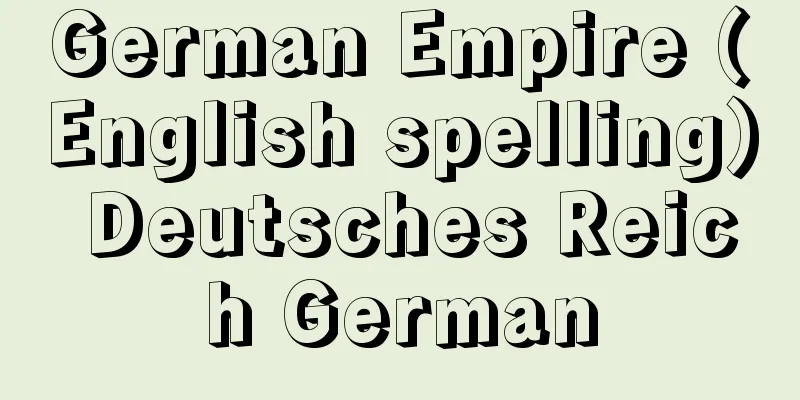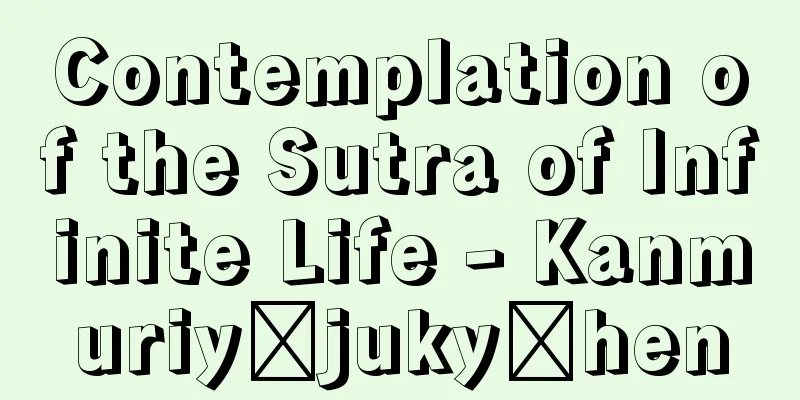German Empire (English spelling) Deutsches Reich German

|
Germany has had two imperial systems in history. The first was the Holy Roman Empire (First Empire, 962-1806) founded by Otto I (the Great), and the second was the Second Empire (1871-1918) that was realized by Bismarck's unification of Germany. In Japan, the latter is usually called the "German Empire." This empire was established in 1871 after the victory in the Prussian-French War, when four South German states joined the North German Confederation. It was a federation consisting of 22 principalities and three free cities, including Prussia, and the head of the empire, that is, the king of Prussia, held the title of emperor, and the government-representing chancellor of the empire was usually held by the Prime Minister of Prussia. Prussia had the power to overwhelm other states in terms of area, population, economic power, and military strength. Although the chancellor was merely a minister appointed by the emperor according to the constitution, his power was great, and Bismarck's dictatorship was virtually exercised during his time in that position. However, after him, the successive chancellors were weak and at the mercy of the emperor, leading to chaos in domestic politics. On the other hand, the members of the Imperial Diet, the legislative body, were elected by popular suffrage and reflected the will of the people well, but their power was limited to budget deliberations and the like, and they had no power to influence politics. However, as time passed, critical forces such as the Social Democratic Party made remarkable advances, and the Imperial Diet also increased its political influence. During this period, German capitalism achieved rapid growth, and its industrial productivity surpassed that of Britain at the beginning of the 20th century, becoming the second largest in the world after the United States. Germany also led the world at that time in academia and culture. With this strength as a backdrop, the German Empire strived to expand overseas and aimed to become a world power. As a result, conflicts with the imperialist powers, including Britain, intensified, and in 1914, the country entered the First World War. After four years of fighting, it was defeated, a revolution (the German Revolution) broke out, the emperor abdicated, and the German Empire collapsed. Hitler's Nazi state (1933-45) also called itself the "Third Reich." [Kitani Tsutomu] "Kitani Tsutomu, 'Research on the History of the Second German Empire' (1977, Aoki Shoten)" [References] |Source: Shogakukan Encyclopedia Nipponica About Encyclopedia Nipponica Information | Legend |
|
ドイツで帝制がとられたことは史上二度ある。最初はオットー1世(大帝)の創始した神聖ローマ帝国(第一帝国、962~1806)で、次がビスマルクのドイツ統一により実現した帝国(第二帝国、1871~1918)である。わが国では普通、後者を「ドイツ帝国」とよぶ。この帝国は1871年、プロイセン・フランス戦争の勝利のあと、北ドイツ連邦に南ドイツ四か国が参加して成立した。プロイセン以下22の君主国と三自由都市からなる連邦で、帝国の元首、すなわち皇帝の位にはプロイセン王がつき、政府を代表する帝国宰相はたいていプロイセン首相が兼ねた。プロイセンは面積、人口、経済力、軍事力で他の邦国を圧倒する実力をもっていた。宰相は憲法上皇帝の任命する一大臣にすぎなかったが、その権限は大きく、ビスマルクがその地位にある間、事実上彼の独裁が行われた。しかし彼のあと、歴代の宰相の力は弱く、皇帝の意のままになって、内政に混乱が生じた。一方、立法府である帝国議会の議員は普通選挙で選ばれ、民意をよく反映したが、その権限は予算審議などに限られ、政治を左右する力をもたなかった。しかし時がたつにつれ、社会民主党のような批判勢力が目覚ましく進出し、帝国議会も政治的影響力を増大させた。この時期、ドイツ資本主義は飛躍的な成長を遂げ、工業の生産力は20世紀初めイギリスを追い抜き、アメリカに次いで世界第二位になった。また、学問や文化でもドイツは当時の世界をリードした。このような実力を背景に、ドイツ帝国は対外膨張に努め、世界の強国を目ざした。このため、イギリスはじめ帝国主義列強との対立が激化し、1914年第一次世界大戦に突入した。4年の戦いののち敗れ、革命(ドイツ革命)が勃発(ぼっぱつ)、皇帝が退位して、ドイツ帝国は崩壊した。 なお、ヒトラーのナチス国家(1933~45)も、これに次ぐものとして「第三帝国」を称した。 [木谷 勤] 『木谷勤著『ドイツ第二帝制史研究』(1977・青木書店)』 [参照項目] |出典 小学館 日本大百科全書(ニッポニカ)日本大百科全書(ニッポニカ)について 情報 | 凡例 |
<<: German Peasants' War - German Peasants' War (English spelling) Bauernkrieg
>>: Deutscher - Isaac Deutscher
Recommend
Relevance
…Evidence used to prove indirect facts is called ...
Biogeographic region
A geographical division based on the characteristi...
Key West (English spelling)
A resort town on Key West Island, at the southwest...
Open Alliance - Open Alliance
…As a result, conferences on American routes are ...
papilla mammal
…the swelling that covers the mammary glands of m...
Kamisunagawa [town] - Kamisunagawa
A town in Sorachi County, Hokkaido. It was a repre...
Kamioroshi - God's blessing
For example, Amenouzume no Mikoto in the Chronicl...
Kusatsu [city] - Kusatsu
A city in southern Shiga Prefecture. It was incorp...
Monoawase - Monoawase
In this game, players are divided into two groups,...
Goya
〘Noun〙① = Gokou (five-day clock)①※Suga Family Book...
DIANA
The name of an air freshener sold by Eikosha Co., ...
Oura iron zither
...It is said to have been introduced to the Kore...
decortication posture
…Individual damage to this system is unlikely, bu...
Lung cancer - pulmonary cancer
It accounts for the majority of primary malignant ...
Inaba Tokikuni - Inaba Tokikuni
…A manor located in Oniyu County, Wakasa Province...









